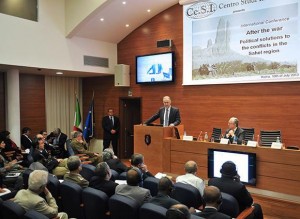10. April, Seoul
visiting South Korean Coast Guard
11. April, Seoul
12. April, Seoul
Remarks at Policy Conference “Regional Cooperation on Maritime Security”
24 – 26 Februar 2014

 Oberst a.D. Ralph Thiele referierte zum Thema Cyber Security in the Maritime Domain und betonte dabei die oftmals missachtete Komplexität des Bereichs der Cyber Security sowie die Notwendigkeit, das Bewußtsein für die tatsächliche Sachlage zu schärfen.
Oberst a.D. Ralph Thiele referierte zum Thema Cyber Security in the Maritime Domain und betonte dabei die oftmals missachtete Komplexität des Bereichs der Cyber Security sowie die Notwendigkeit, das Bewußtsein für die tatsächliche Sachlage zu schärfen.
Weitere Treffen gab es mit dem Leiter der Security Studies Abteilung, Herrn Tomonori Yoshizaki, und andere Repräsentanten des National Institute for Defense Studies sowie den Deputy Director General, Herrn Hideki Asari, und weitere Experten des Japan Institute of International Affairs.
 In einer öffentlichen Veranstaltung der Tokyo Foundation erläuterte Oberst a.D. Thiele Konsequenzen des sogenanten „Pacific Shift“ auf die Sicherheit im maritimen Bereich. Nach weiteren Vorträgen seitens Vizeadmiral a.D. Lutz Feldt und Dr. Peter Roell wurde im Rahmen des 63. Tokyo Foundation Forum die Diskussion unter Beteiligung der drei deutschen Experten, sowie folgender Vertretern der Tokyo Foundation weitergeführt (v.l.n.r.):
In einer öffentlichen Veranstaltung der Tokyo Foundation erläuterte Oberst a.D. Thiele Konsequenzen des sogenanten „Pacific Shift“ auf die Sicherheit im maritimen Bereich. Nach weiteren Vorträgen seitens Vizeadmiral a.D. Lutz Feldt und Dr. Peter Roell wurde im Rahmen des 63. Tokyo Foundation Forum die Diskussion unter Beteiligung der drei deutschen Experten, sowie folgender Vertretern der Tokyo Foundation weitergeführt (v.l.n.r.):
Field Study Brazil & Delegation of Hans-Joachim Otto, State Secretary at the Federal Ministry for Economic Affairs

10 July, 2013, Rome
 Globalisation has deeply shaped the contemporary world, affecting both its economic development and its political dynamics. Without doubt, the exponential spread of traditional media and social networks increased the openness of societies across the globe to democracy and to its mechanisms of participation.
Globalisation has deeply shaped the contemporary world, affecting both its economic development and its political dynamics. Without doubt, the exponential spread of traditional media and social networks increased the openness of societies across the globe to democracy and to its mechanisms of participation.
 In this ever-changing context, Nation-States, international organizations and civil society movements, are still absolutely engaged in issues relating to ethnic minorities and respect of their civil, political, economic and social rights. Today more than ever, these issues overcome national borders and become problems of international, or at least, regional, interest.
In this ever-changing context, Nation-States, international organizations and civil society movements, are still absolutely engaged in issues relating to ethnic minorities and respect of their civil, political, economic and social rights. Today more than ever, these issues overcome national borders and become problems of international, or at least, regional, interest.

ABU DHABI // International defence experts have called on Arabian Gulf countries to establish military command systems able to exchange and share information at the click of a button.
The calls were made yesterday at the C4ISR Summit (Command, Control, Communication, Cyber, Intelligence, Surveillance and Reconnaissance) in Abu Dhabi.
The GCC secretary general, Dr Abdullatif Al Zayani, told the summit that the GCC was politically in unison and called for the countries‘ militaries to follow suit. „GCC countries have to be able to be integrated and interoperable to share intelligence and information and be ready to work together at a higher and more complete level,“ he said.
According to the German Air Force’s director of projects and chairman of the Political-Military Society in Berlin, retired Col Ralph Thiele, the C4ISR concept is the provision of information, intelligence and knowledge to decision makers in order to provide for superior situational awareness and decision-making with regard to achieving desired effects.
„I suggested to the EU to get its act together in sharing information and being more interoperable, and this is my suggestion to the Gulf countries,“ Col Thiele said.

Over the past decade the Gulf States have made important strides in developing their own defensive capabilities, strengthening their bilateral relationships with Western military forces, and even integrating their armed forces. But can they do more? This paper argues that the acquisition and application of C4ISR capabilities and assets would further enhance the Gulf States‘ situational awareness, speed up their decision-making processes, and improve their capacity for decisive action.
© 2013 Institut für Strategie- Politik- Sicherheits- und Wirtschaftsberatung (ISPSW)
Download: English (PDF · 13 pages · 219 KB)
Author: Ralph D Thiele
11. April, Seoul
